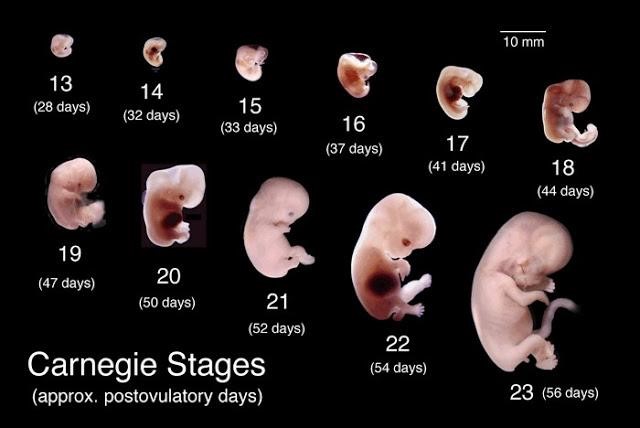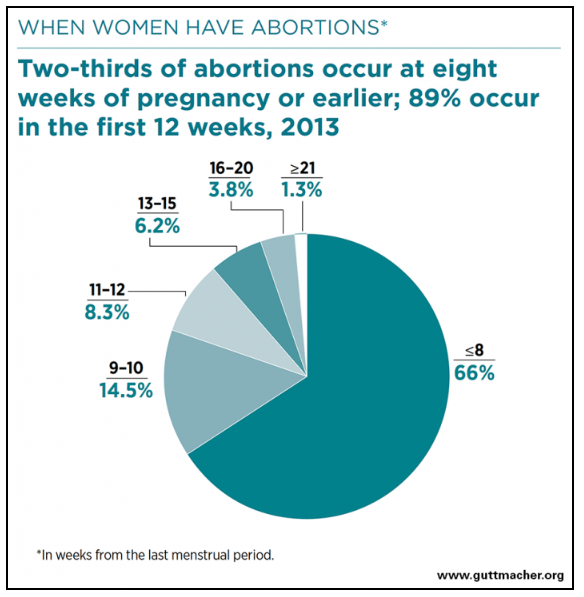3 Fetal Consciousness & Facts about Abortions
To responsibly discuss any practical moral issue, we need to know factual information about the issue. Here’s a brief overview of some of the most relevant information, and some initial discussion of its moral significance.
3.1 Fetal Consciousness
The most important information about the development of fetuses is when they become conscious or aware, or when they become able to feel anything. Scientific evidence suggests consciousness likely emerges, at the earliest, after the first trimester, at least three or four months into pregnancy. (To review this research, search the US National Library of Medicine at PubMed.gov for fetal pain and fetal consciousness.[1]) Consciousness develops after most abortions occur, so most abortions do not affect conscious, feeling fetuses.

Source: Brad Smith at http://embryo.soad.umich.edu/carnStages/carnStages.html
Concerns about consciousness and feeling in fetuses are most important for them because they are fundamentally what’s most important for us. Consciousness enables us to have and experience anything good in life, and it is necessary for anything bad to happen to us also: without a point of view, things can’t get worse for us.
Imagine that someone was born unconscious and lived their entire existence unconscious: they were never aware of anything, ever. They had no perceptions, no awareness, no feelings, and of course no relationships, knowledge, happiness, or even sadness. And then they died. What were they like? Honestly, they never were: there was never anyone there. If anything bad ever happened to this body, nothing bad ever happened to them, since “they” never existed in a way that matters. No “window to the world” was opened through them, so to speak.[2]
Consider also if you died prematurely, or were killed, or even if you went into a permanent coma or vegetative state, perhaps for many years or decades, and then died. Either option is very bad for you: since your consciousness ends, you end. (If you believe or hope that you will “live on” after death, you likely believe that your consciousness—your knowledge, your memories, your personality—continues after death, either with a rebuilt body, a new body or no body at all).
If people “end” when their consciousness permanently ends, then it seems that people don’t yet exist before there is a consciousness. Rocks aren’t conscious, plants aren’t conscious, and that’s why they lack rights. Minds matter, and so the fact that embryos and early fetuses completely lack minds—due initially to the absence of a brain and nervous system, and later due to these not being sufficiently developed to support consciousness—is what’s morally significant, not whether fetuses have heartbeats, or can move, or even respond to stimuli, if those responses aren’t genuinely felt by the fetus.
3.2 When Most Abortions Occur
Most abortions occur early in pregnancy: two-thirds in the first two months, and around 90% in the first three months. The Guttmacher Institute researches these matters and provides this graph:

Source: https://www.guttmacher.org/fact-sheet/induced-abortion-united-states
The US’s Centers for Disease Control (CDC) also provides research on the factual circumstances of abortions, which it presents as “Abortion Surveillance” that is readily available online.
3.3 Why Most Abortions Occur
The Guttmacher “Fact Sheet” provides an overview of the research on why abortions occur and other relevant information:
- The reasons patients gave for having an abortion underscored their understanding of the responsibilities of parenthood and family life. The three most common reasons—each cited by three-fourths of patients—were concern for or responsibility to other individuals; the inability to afford raising a child; and the belief that having a baby would interfere with work, school or the ability to care for dependents. Half said they did not want to be a single parent or were having problems with their husband or partner.
- Fifty-one percent of abortion patients were using a contraceptive method in the month they became pregnant, most commonly condoms (24%) or a hormonal method (13%).
- Fifty-nine percent of abortions were obtained by patients who had had at least one birth.
- Some 75% of abortion patients were poor or low-income. Twenty-six percent of patients had incomes of 100–199% of the federal poverty level, and 49% had incomes of less than 100% of the federal poverty level ($15,730 for a family of two).
This information suggests, at least, that if women were economically better off, had better access to affordable child-care and other forms of support, and had ready access to more reliable forms of contraception, there would likely be fewer abortions.
Some argue that people who wish to criminalize abortion should support efforts to reduce the numbers of abortions, say by providing these types of support for women so they are less inclined to seek abortions. This is understandable (although subject to objections, of course): if something is wrong, people who can prevent it should try to do so.
To be fair, however, we should think about why some people might deny this, for this issue. (Abortion is a topic where it seems especially common that many people don’t know what people who disagree with them think or why they think that: a goal of this essay is to help with this problem.) Here’s an imperfect analogy: burglary is wrong: people shouldn’t burgle. Should there be special programs and supports to help people not burgle? Some might say ‘no’: all that’s needed to address burglary is for people to just stop stealing stuff: nobody else needs to do anything about it. And so, by analogy, some who argue that abortion is wrong might say that women just need to stop having abortions, but nobody else must help make that happen.
While this response is understandable, it does not seem to fit with many of the Christian values, as well as general concerns about doing good for others, that many who oppose abortion claim to profess: e.g., this attitude is very contrary to the messages of “love your neighbor” (even if you think your neighbor is engaged in wrongdoing) and the parable of the “Good Samaritan,” discussed later in this essay (perhaps the priest or Levite in the story thought, “I didn’t rob the guy, so I don’t have to help him: the problem was the robbers, not my not helping him!” but that is not an admirable response), and hence the common charge of hypocrisy and arbitrary, unjustified selectivity in moral concern.
While some of the above factual claims are potentially debatable, we still need to use critical thinking to assess the evidence for any contrary claims. And, most importantly, we need to think about what would and would not follow, morally, from different sets of facts, given the moral arguments that are discussed below.
[1] It should be acknowledged that although there is a lot of research on fetal pain, there seems to be less direct discussion of when, if ever, fetuses might become conscious yet without being able to feel anything pleasurable or painful, or any good or bad feelings. This, however, should be acknowledged as a peculiar form of existence: being in complete darkness, and able to feel things, yet nothing in any way feels good or bad to you would be, well, hard to imagine!
[2] This metaphor comes from Bob Fischer, who presented it in a beautiful and moving eulogy, describing someone’s passing away as the irreparable breaking of a window to the world.
